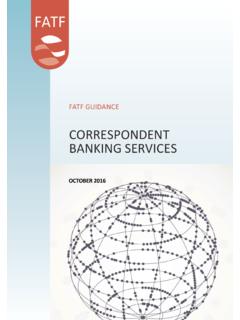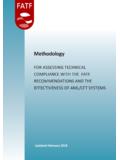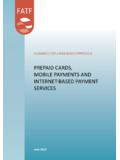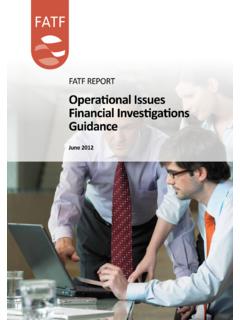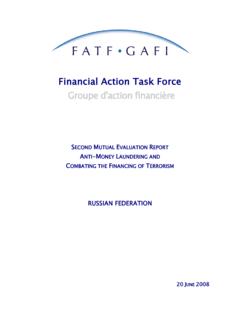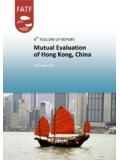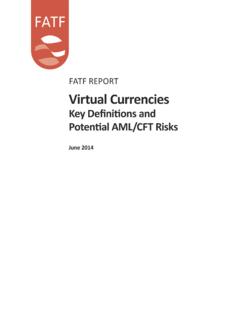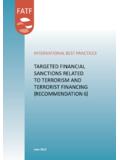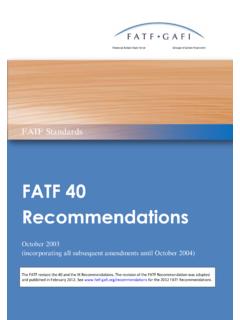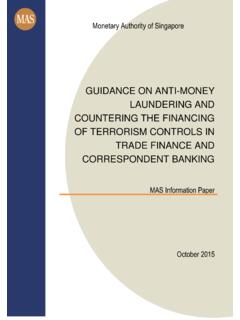Transcription of FATF 40 Recommendations
1 Financial Action Task Force Groupe d'action financi re FATF Standards FATF 40. Recommendations October 2003. (incorporating all subsequent amendments until October 2004). The FATF revised the 40 and the IX Recommendations . The revision of the FATF Recommendation was adopted and published in February 2012. See for the 2012 FATF Recommendations . 2010 FATF/OECD - 1. FATF 40 Recommendations INTRODUCTION. Money laundering methods and techniques change in response to developing counter-measures. In recent years, the Financial Action Task Force (FATF) 1 has noted increasingly sophisticated combinations of techniques, such as the increased use of legal persons to disguise the true ownership and control of illegal proceeds, and an increased use of professionals to provide advice and assistance in laundering criminal funds.
2 These factors, combined with the experience gained through the FATF's Non-Cooperative Countries and Territories process, and a number of national and international initiatives, led the FATF to review and revise the Forty Recommendations into a new comprehensive framework for combating money laundering and terrorist financing. The FATF now calls upon all countries to take the necessary steps to bring their national systems for combating money laundering and terrorist financing into compliance with the new FATF Recommendations , and to effectively implement these measures.
3 The review process for revising the Forty Recommendations was an extensive one, open to FATF. members, non-members, observers, financial and other affected sectors and interested parties. This consultation process provided a wide range of input, all of which was considered in the review process. The revised Forty Recommendations now apply not only to money laundering but also to terrorist financing, and when combined with the Eight Special Recommendations on Terrorist Financing provide an enhanced, comprehensive and consistent framework of measures for combating money laundering and terrorist financing.
4 The FATF recognises that countries have diverse legal and financial systems and so all cannot take identical measures to achieve the common objective, especially over matters of detail. The Recommendations therefore set minimum standards for action for countries to implement the detail according to their particular circumstances and constitutional frameworks. The Recommendations cover all the measures that national systems should have in place within their criminal justice and regulatory systems; the preventive measures to be taken by financial institutions and certain other businesses and professions; and international co-operation.
5 The original FATF Forty Recommendations were drawn up in 1990 as an initiative to combat the misuse of financial systems by persons laundering drug money. In 1996 the Recommendations were revised for the first time to reflect evolving money laundering typologies. The 1996 Forty Recommendations have been endorsed by more than 130 countries and are the international anti- money laundering standard. In October 2001 the FATF expanded its mandate to deal with the issue of the financing of terrorism, and took the important step of creating the Eight Special Recommendations on Terrorist Financing.
6 These Recommendations contain a set of measures aimed at combating the funding of terrorist acts and terrorist organisations, and are complementary to the Forty Recommendations2. A key element in the fight against money laundering and the financing of terrorism is the need for countries systems to be monitored and evaluated, with respect to these international standards. The mutual evaluations conducted by the FATF and FATF-style regional bodies, as well as the assessments conducted by the IMF and World Bank, are a vital mechanism for ensuring that the FATF Recommendations are effectively implemented by all countries.
7 1. The FATF is an inter-governmental body which sets standards, and develops and promotes policies to combat money laundering and terrorist financing. It currently has 36 members: 34 countries and governments and two international organisations; and more than 20 observers: five FATF-style regional bodies and more than 15 other international organisations or bodies. A list of all members and observers can be found on the FATF website at 2. The FATF Forty and Eight Special Recommendations have been recognised by the International Monetary Fund and the World Bank as the international standards for combating money laundering and the financing of terrorism.
8 2 - 2010 FATF/OECD. FATF 40 Recommendations THE FORTY Recommendations . A. LEGAL SYSTEMS. Scope of the criminal offence of money laundering 1. Countries should criminalise money laundering on the basis of the United Nations Convention against Illicit Traffic in Narcotic Drugs and Psychotropic Substances, 1988 (the Vienna Convention) and the United Nations Convention against Transnational Organized Crime, 2000. (the Palermo Convention). Countries should apply the crime of money laundering to all serious offences, with a view to including the widest range of predicate offences.
9 Predicate offences may be described by reference to all offences, or to a threshold linked either to a category of serious offences or to the penalty of imprisonment applicable to the predicate offence (threshold approach), or to a list of predicate offences, or a combination of these approaches. Where countries apply a threshold approach, predicate offences should at a minimum comprise all offences that fall within the category of serious offences under their national law or should include offences which are punishable by a maximum penalty of more than one year's imprisonment or for those countries that have a minimum threshold for offences in their legal system, predicate offences should comprise all offences, which are punished by a minimum penalty of more than six months imprisonment.
10 Whichever approach is adopted, each country should at a minimum include a range of offences within each of the designated categories of offences3. Predicate offences for money laundering should extend to conduct that occurred in another country, which constitutes an offence in that country, and which would have constituted a predicate offence had it occurred domestically. Countries may provide that the only prerequisite is that the conduct would have constituted a predicate offence had it occurred domestically. Countries may provide that the offence of money laundering does not apply to persons who committed the predicate offence, where this is required by fundamental principles of their domestic law.
